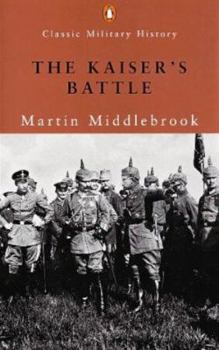The Kaiser's Battle
Select Format
Select Condition 
Book Overview
At 9.30am on 21 March 1918, the last great battle of the First World War commenced when three German armies struck a massive blow against the weak divisions of the British Third and Fifth Armies. It... This description may be from another edition of this product.
Format:Paperback
Language:English
ISBN:0141390263
ISBN13:9780141390260
Release Date:January 2000
Publisher:Penguin Books Ltd
Length:448 Pages
Weight:1.05 lbs.
Dimensions:8.5" x 1.3" x 5.3"
Customer Reviews
3 ratings
First Rate Work by First Rate Historian
Published by Thriftbooks.com User , 15 years ago
"The Kaiser's Battle", by British Military Historian Martin Middlebrook, is an excellent book detailing the preparation, build-up, and first day of battle of the 1918 German Spring Offensive on the Western Front (known as the "Kaiser's Battle", or in German, as the "Kaiserschlacht") from both the British and German perspective. This book was originally published in 1978, and Mr. Middlebrook, as he did for his earlier (and in many ways companion) work "The First Day on the Somme", actively sought and collected numerous written and oral accounts from surviving British and German soldiers. As such, he was one of the last historians to actually speak with the veterans of this conflict on a significant scale. By focusing on only the first day of battle, Mr Middlebrook is able to provide a sharp and focused look at the start of the battle, one that gives the reader a real feel for the critical opening phases of the fighting. Through his extensive research and astute analysis, Mr. Middlebrook discusses what went right for both sides, what went wrong, and explodes more than a few myths about the battle. He also shows that while on the surface the first day of battle appeared to be a German victory, the strategic results were much less favorable and the seeds of eventual German defeat were present. I highly recommend this book.
An important account.
Published by Thriftbooks.com User , 17 years ago
This book was the first major study into the early phases of WW1 and compliments this authors own earlier work "First Day on the Somme." On 21 March 1918 the Germans commenced a 5 hour bombardment of British troops. This was followed by one of the greatest (in terms of manpower on both sides) battles of all time as no fewer than 3 German armies attacked 2 British Armies. This was the first the first day of Kaiserschlacht - The Kaiser's Battle. Author Martin Middlebrook provides a thrilling and complete account of the events. He describes in great detail both sides in terms of preparation, tactics and defence, the expectations of the generals in charge as well as the hopes and fears of the ordinary soldiers. Having set the scene, he then examines the battle itself in great detail by use of original records. First published in 1978, the author then traced or 600 survivors from this great battle whom he questioned at length in order to provide the reader with the most balanced view of the fighting. Whilst many historians will record history from official documents and the accounts of those who were placed in charge, Martin Middlebrook provides an extra dimension by including vital input from those who took part right at the front. NM
Disaster in the Fog
Published by Thriftbooks.com User , 24 years ago
Middlebrook provides an in-depth account of the first day of the great German offensive on 21 March 1918. He uses accounts from 650 German and British survivors, interwoven with a lot of good statistics. The strength of this work is that it provides a good perspective on both armies, excellent orders of battle and a well-reasoned analysis section. Middlebrook makes several major points. First, the British were not let down by their intelligence; they knew the attack was coming but they thought it would develop more slowly, like all previous West Front offensives. Second, German infiltration tactics were used only by the spearheads, while the bulk of the following infantry advanced in standard lines. The key factor in the German success was the heavy fog, which greatly assisted infiltration by reducing the range of British defensive fires to the point where gaps existed. Middlebrook concludes that the British were not experts at defense and morale was poor in some war-weary units, but the defense would have done far better without the fog. After reading this, it causes the reader to wonder why more First World War attacks didn't use fog as cover to reduce casualties. Middlebrook also exonerates General Gough, the Commander of the British 5th Army that was smashed, whom he claims was a scapegoat. Middlebrook estimates that the Germans lost over 10,000 killed in the first day, despite a successful attack. The British lost only about 7,500 killed but another 21,000 were captured (and 500 artillery pieces). Although the maps are often inadequate, this is a well-written and thoroughly-researched account.






